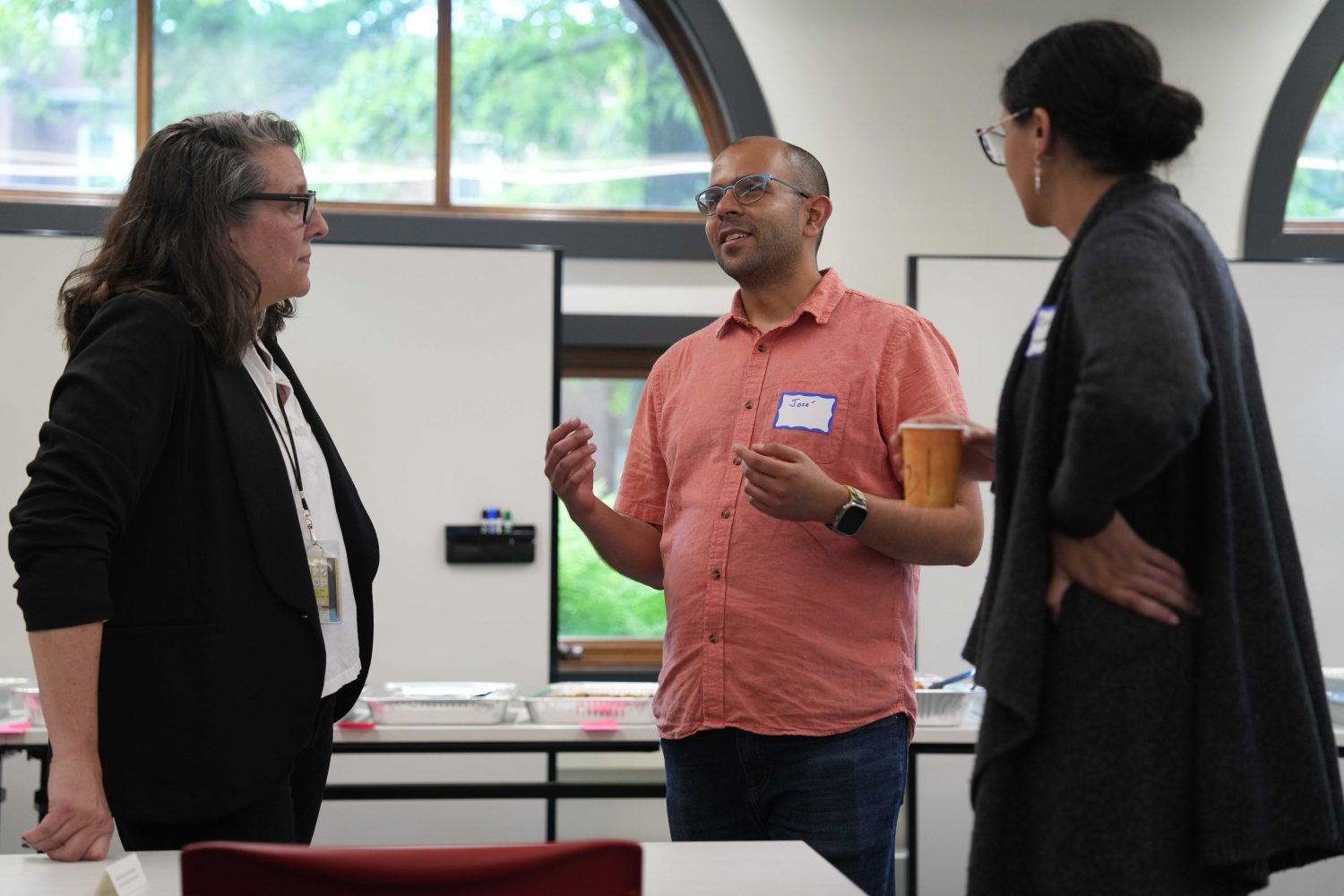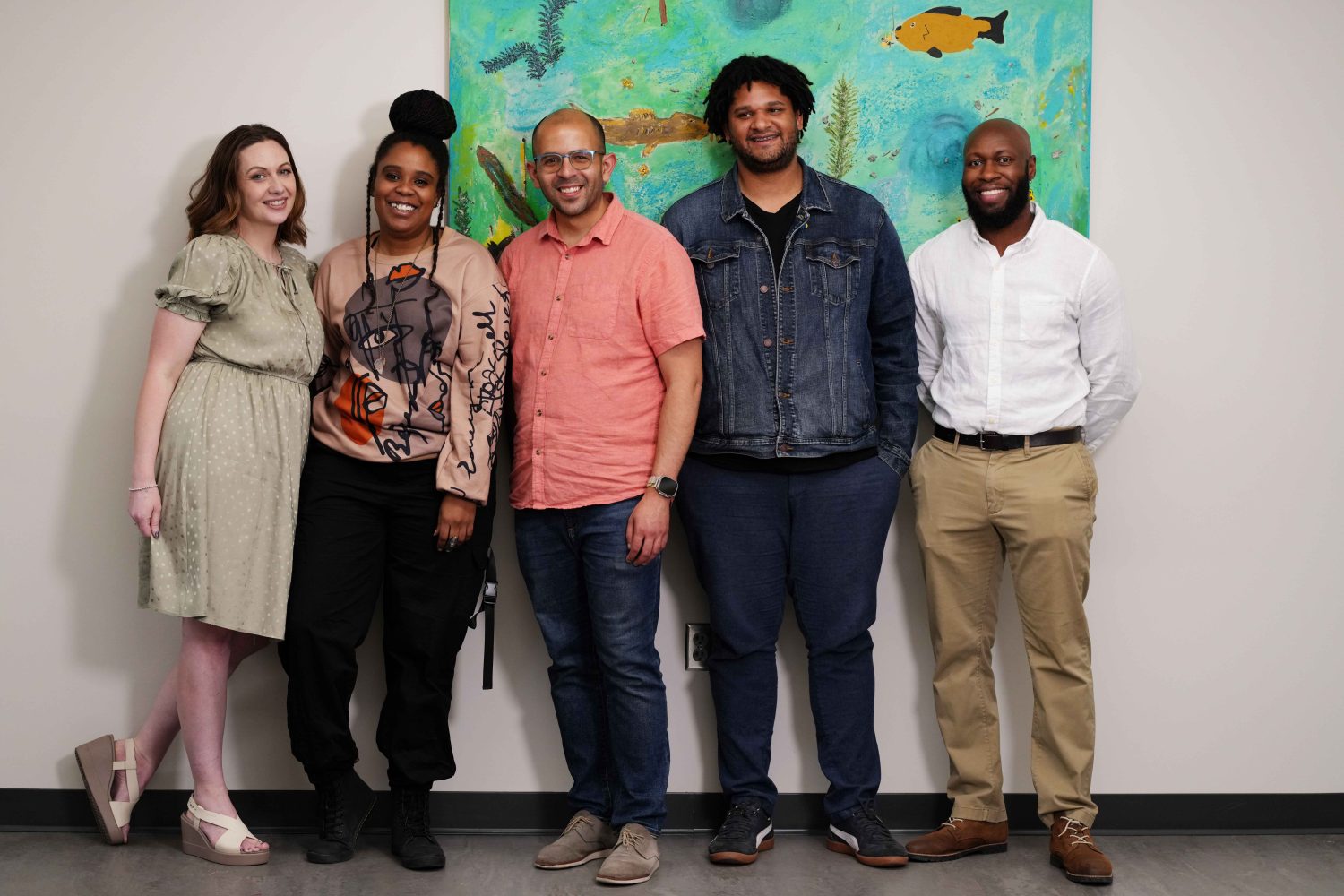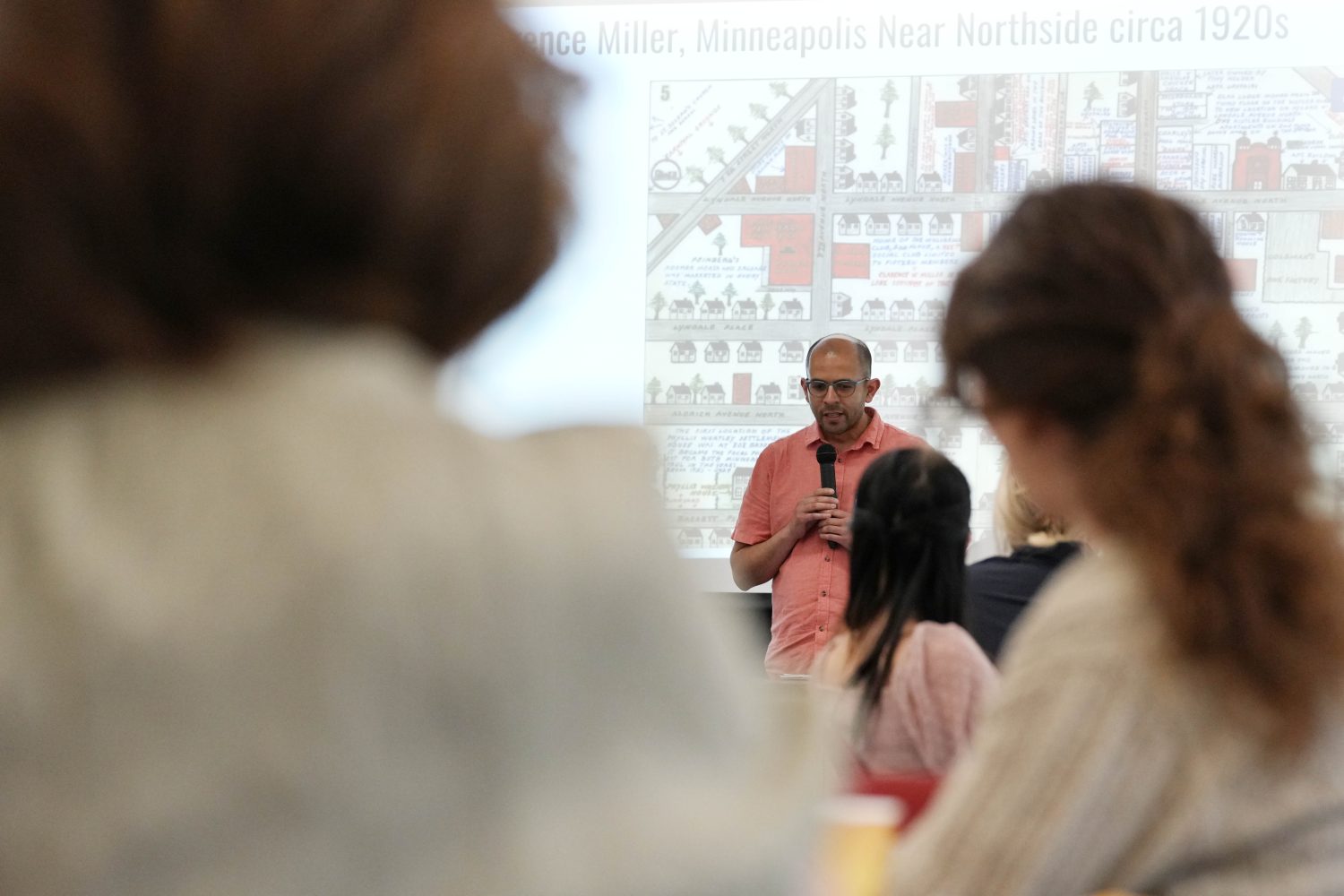By Adria Carpenter

Rebecca Gillette (left) and José Antonio Zayas Cabán (center) talk on Wednesday, May 24, 2023. (Photo/Luke Logan)
José Antonio Zayas Cabán wants to humanize Minneapolis’ communities of color — to show that they’re just as worthy of investment as white communities — and after a nine-month fellowship with Mapping Prejudice, he’s more prepared than ever.
Zayas Cabán is the executive director of Our Streets Minneapolis, a nonprofit that works to reevaluate transportation and infrastructure in the Twin Cities, and remedy the past and current harms of car-centric development on local communities — like 6th Avenue North in the 1930s, a lively Black and Jewish neighborhood that was paved over to construct the Olson Memorial Highway.
“Urban planning, transportation, land use, and infrastructure in general, in many ways, has been one of the biggest drivers for the violent dispossession and destruction of cultural centers and cultural corridors in the United States,” Zayas Cabán said.
Cabán’s work overlapped with Mapping Prejudice, a University of Minnesota Libraries project started in 2016 that has mapped 26,000 racial covenants in Hennepin and Ramsey counties. These covenants — along with redlining, exclusionary zoning laws, racial steering, etc. — corralled people of color into segregated neighborhoods that were then targeted for urban renewal and transportation projects, displacing countless residents and families.
Collaboration with Mapping Prejudice a ‘natural step’
For Zayas Cabán, collaborating with Mapping Prejudice was a “natural step.”
“It’s really well understood what racial covenants were, and what they did specifically at that point in time. I think we’re just scratching the surface in terms of how it has impacted present day living conditions for marginalized communities,” he said.
Mapping Prejudice has always relied on volunteers to help comb through records and compile data, but the team wanted to sow stronger ties with the communities of color and help them achieve racial justice. Rebecca Gillette, the community engagement lead, developed the fellowship program to support local leaders by providing access to the University of Minnesota’s resources.
“There’s so much that libraries can do in support of communities. We want to share that with community members and figure out ways in which we can co-create,” Gillette said. “What could community members potentially do with this data in new and different ways?”
The fellowship was funded by a $615,000 grant from the Andrew W. Mellon Foundation. In addition to Zayas Cabán, the program had five other fellows:
- Sidney Stewart and Ismali Khadar, co-directors of the East Side Freedom Library’s housing justice program
- Malik Mitchell, an insights and innovation strategist for the consulting firm. Image Deliver
- TiArra “Crown” Shepard, author of Black Boy, Black Boy and Black Girl, Black Girl
- Kara Cisco, a social studies teacher and ethnic studies course developer.

From left to right, Kara Cisco, TiArra “Crown” Shepard, José Antonio Zayas Cabán, Ismali Khadar, and Malik Mitchell pose for a portrait on Wednesday, May 24, 2023. (Photo/Luke Logan)
Fellows worked directly with UMN librarians
The first half of the fellowship, beginning in September of 2022, exposed the group to different resources. They met with members of the Center for Urban and Regional Affair (CURA), explored the University Libraries’ Archives and Special Collections, and learned how to navigate Zortero under the guidance of University librarians.
“Many of the fellows connected directly with the library staff members throughout the nine-month program,” Gillette said. “There was this great body of knowledge within the Libraries that was supportive of them.”
During the second half, the fellows used their monthly sessions as a collaborative workspace, getting feedback and ideas from each other on their respective projects. In-between sessions, Gillette met with each fellow to provide individual support.
Zayas Cabán enjoyed making decisions alongside the other members, and he hopes they’ll become longtime partners in future projects. He especially appreciated the Libraries’ depth of historical data, which illustrated why communities like 6th Avenue North should be resorted, and helped refine Our Streets’ advocacy and messaging.
“The [geographic information system] mapping that they’ve done, all the data collection that they’ve done, and all of the research that they’ve done, has made its way into some of the information that we communicate now to the public,” Zayas Cabán explained.
But Our Streets Minneapolis isn’t the only community advocacy group that could benefit from the University’s resources. Zayas Cabán hopes Mapping Prejudice can secure more funding for another round of fellows and for a longer period.

José Antonio Zayas Cabán presents his work with Our Streets Minneapolis on Wednesday, May 24, 2023. (Photo/Luke Logan)
“Institutions like the University of Minnesota, that were built on land grants that profited from the dispossession of Native American lands, can do more to take responsibility for their own histories, and democratize a lot of their resources, and make them more accessible,” he said. “They could have a more direct hand impacting the kinds of outcomes that honestly aim to repair some of the harms that they caused themselves.”
Gillette views the inaugural fellowship as a pilot, and she’s currently evaluating which aspects were effective and what may change in the future. They might aim for more synergy in a potential second cohort, either through shared project topics, geography, or history. Gillette believes the first round of fellows will be strong community partners to the Libraries, possibly returning as mentors for the next cohort.
Eventually, Mapping Prejudice wants to create a sustainable model for the fellowship that would occur annually. In the meantime, they’re continuing to increase awareness around past and contemporary housing disparities, recruit volunteers, and collaborate with interested community members.
“My hope is that another year of fellowships will continue to create more awareness around present day impacts that come out of the research that they’ve uncovered,” Zayas Cabán said.




